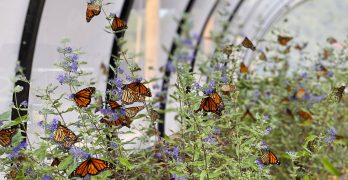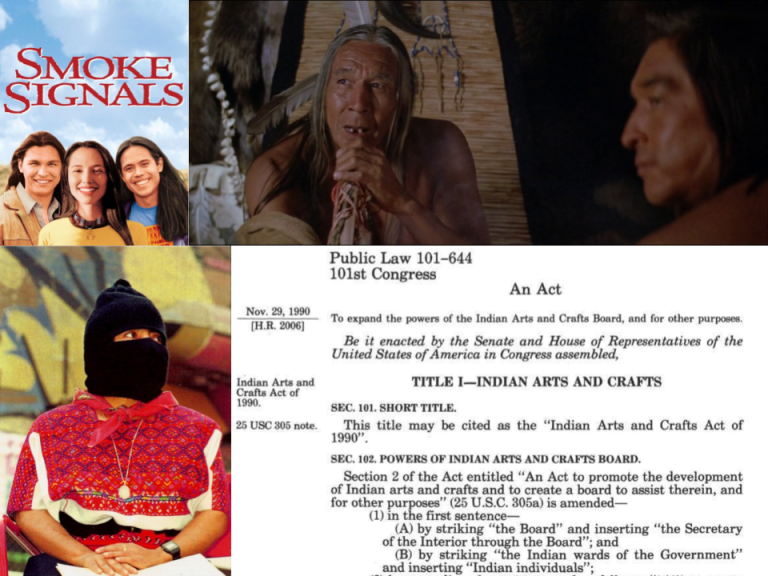The state of Alaska is actively working to shut down a gaming hall just opened by the Native Village of Eklutna. The Chin’an Gaming Hall is doing a brisk business with pulltabs and 85 bingo machines in an unassuming building just outside of Anchorage. But state officials maintain the operation is illegal because the tribe does not control the land it is on. Elsewhere, in Maine, tribes are also working against state resistance to expand gaming. They face a regulatory reality that is different from tribes in other states because of legislation in 1980 limiting Maine’s tribes’ gaming enterprise ability.
Coming Up on NATIVE AMERICA CALLING

Friday, April 18, 2025 — Celebrating Native poetry
Elise Pacshen’s (Osage) new book of poetry, “Blood Wolf Moon” weaves Osage stories from the Reign of Terror with her experience as the daughter of famous major prima ballerina, Maria Tallchief. m.s. RedCherries’ (Northern Cheyenne) first poetry book, “mother” was a 2024 National Book Award for Poetry finalist. It follows the Cheyenne protagonist who is exploring Indian identity as a former boarding school student reconnecting to her roots and larger Native community through the backdrop of the American Indian Movement. “Indigenous Poetics” is a collection of essays illustrating how Native poets use their craft as a critical tool to help readers understand, question and realize deeper layers of Indigenous life and community. Aligning with National Poetry Month, we’ll dive into these new and recent publications by Indigenous poets.
Past Shows

Tuesday, April 15, 2025 — Counteracting a pollinator crisis
The recent winter proved deadly for honey bee colonies. The Washington State University’s Honey Bees and Pollinators Program reports mass die-offs for commercial beekeepers. Honey bees, butterflies, and even small vertebrates like bats and birds are important to agriculture and are indicators of a healthy ecosystem. Their populations fluctuate and are affected by pesticide use, habitat loss, and climate change. Tribes and Native groups like the Euchee Butterfly Farm are among those devoting resources to pollinator restoration work. We’ll talk with Native pollinator protectors about efforts to help turn the threat to pollinators around.
GUESTS
Nathan Moses-Gonzales (Confederated Tribes of the Colville Reservation), entomologist and CEO of M3 Agriculture Technologies
Jane Breckinridge (Muscogee and Euchee), director of the Euchee Butterfly Farm and the Tribal Alliance for Pollinators
Melanie Kirby (Tortugas Pueblo), professional beekeeper, founder of Zia Queen Bees Farm and Field Institute, extension educator and pollinator specialist at IAIA, and a founder of Poeh Povi Flower Path Network
Pam Kingfisher (Cherokee Nation), beekeeper and water protector

Monday, April 14, 2025 — This week on the federal chopping block: libraries, museums, low-income heating, and food sovereignty
At least one tribal library in New Mexico will have to close after the Trump Administration abruptly canceled federal grants administered through the Institute for Museum and Library Services. Many more libraries and museums in the state and around the country are forced to cut hours, eliminate staff, cancel traditional programs, and curb purchases for new books and other materials. They are among the latest in the on-going efforts by the Trump Administration to drastically change federal services. Those cuts also include supplements to low-income Navajo Nation citizens and hundreds more Native Americans nationwide who rely on the funds to help them heat their homes in the winter. We’ll get the latest rundown of staff and funding reductions by the federal government.

Friday, April 11, 2025 — Contemporary Pueblo architects reclaim ancestral knowledge
Early Pueblo residents are known for their complex, multi-level dwellings that date back centuries, but continue to influence architectural design today. A new exhibit at the Indian Pueblo Cultural Center examines the enduring elements of ancestral architecture and how contemporary Pueblo architects are reclaiming them. Modern designs fell victim to non-Native interpretations and modern building codes. The exhibit, “Restorying Our HeartPlaces: Contemporary Pueblo Architecture”, tells the story of how Pueblos are asserting their sovereignty over their enduring architectural knowledge.

Thursday, April 10, 2025 – Flexing tribal strength during turbulent times
Tens of thousands of federal job cuts, on-again, off-again tariffs on everyday goods, and policies affecting the operations of schools, businesses, and tribal governments are generating widespread uncertainty. Tribal leaders are working proactively to both influence decisions at the federal level and to prepare for inevitable changes. We’ll talk with tribal leaders about how they are adapting to the unpredictable and dramatic changes headed their way.

Wednesday, April 9, 2025 — Medicaid, Medicare, health care, and food safety on the line
U.S. Health and Human Services Secretary Robert Kennedy Jr. is overseeing an unprecedented cut of nearly a quarter of the department’s staff, drawing widespread concerns about possible adverse affects for thousands of Native Americans who depend on those services. Everything from bill processing to testing and research to prevent lead contamination in children could be constricted. At the same time, Sec. Kennedy successfully reversed Elon Musk’s termination of 900 Indian Health Service employees by the Department of Government Efficiency. Kennedy is also reaching out to tribes and maintaining contact through the department’s Tribal Self Governance Advisory Committee. We’ll look at the latest word on what some of the potential effects of the federal actions are on Native health and health care.

Tuesday, April 8, 2025 – Philanthropy fills in the gaps
Philanthropy matches a donor’s passion with an organization’s drive to make a difference. It is an arrangement that helps build equity in areas that are not served by profit-driven interests. Philanthropy becomes even more important during times of financial uncertainty and government austerity. We’ll get a view of the current directions for philanthropic giving and what the new pressures to fill the gaps.

Monday, April 7, 2025 – The next 50 years of self-governance
Cherokee Principal Chief Chuck Hoskin, Jr. calls the Indian Self-Determination and Education Assistance Act (ISDEA) “one of the singular accomplishments of this country”. The legislation championed by President Richard Nixon opened the doors to tribal control over their own health care, law enforcement, natural resources management and economic development. We’ll look at the progress since ISDEA, and what tribes intend to strengthen self-governance in the future.

Friday, April 4, 2025 – Fresh Native creativity: ‘Fake It Until You Make It’ and ‘Navajo Highways’
In Larissa FastHorse’s (Sičháŋǧu Lakota) new play, a nonprofit works to accommodate “race shifters”, people who are compelled to change the ethnicity they’re born with. “Fake it Until You Make It” is a satirical look at the serious topic of Native identity, helped out by a talented cast and Indigenous-grounded writing.
The new children’s TV puppet series, Navajo Highways, is making the rounds on screens across the Southwest. Written and directed by Pete Sands (Diné), the show follows young Sadie from her urban home to her introduction to Navajo land, culture, language and food. With a nod to the popular PBS show, Sesame Street, it’s filled with characters Native audiences will find familiar. It’s slated for public distribution on FNX.

Thursday, April 3, 2025 – The unpredictable new trade landscape
Indigenous business leaders in the U.S. and all over the world will now have to adjust to the uncertain effects of President Donald Trump’s aggressive new series of tariffs. Economic experts predict some measure of chaos in the short term. It’s impossible to predict how the tariffs will play out in the long run, but it will certainly affect everything from the beads used in regalia to groceries to auto sales. Trump insists the new tariffs will put American businesses on a more level playing field and boost the federal government’s coffers. We’ll hear how Native business experts are responding to the new economic reality.
Search Our Archive
Through The Decades

Wednesday, July 27, 2022 — Through The Decades: 1990s
The U.S. Congress passed both the Native American Graves Protection and Repatriation Act and the Indian Arts And Crafts Act in 1990—two pieces of legislation with significant power to protect culture. On the international front, the Zapatista Army of National Liberation in Mexico rose up in an effort to reclaim their land and resist globalization. Dances With Wolves captured audiences’ attention with a Native cast and a Best Supporting Actor Oscar nomination for Graham Greene, while a new generation of Native writers and directors made their voices heard. Today on Native America Calling, Shawn Spruce remembers the Native ’90s, as part of our series Through The Decades. Shannon Keller O’Loughlin (Choctaw), executive director of the Association on American Indian Affairs, and Vincent Schilling (Akwesasne Mohawk), editor of NativeViewPoint.com and certified Rotten Tomatoes critic.

Wednesday, July 20, 2022 – Through the Decades: 1980s
The 1980s saw the rise of gaming on Native nations, a momentum that brought about the Indian Gaming Regulatory Act in 1988 with revenue quickly hitting $100 million. Wilma Mankiller became the first female Principal Chief of the Cherokee Nation and Ben Nighthorse Campbell started his long and historic career as an elected leader. Today on Native America Calling, Shawn Spruce has the next installment of our new series Through the Decades with Dr. James Riding In (Pawnee), a retired professor and founding member of the American Indian Studies program at Arizona State University focusing on repatriation, sacred sites protection, and Pawnee history and culture; Larry Nesper, Emeritus Professor of Anthropology and American Indian Studies at the University of Wisconsin-Madison and author of the book The Walleye War: The Struggle for Ojibwe Spearfishing and Treaty Rights; and America Meredith (Cherokee), writer, visual artist, independent curator, and publishing editor of “First American Art Magazine”.

Wednesday, July 13, 2022 – Through the Decades: the 1970s
Watergate, Vietnam, and disco are some of the major highlights that define the 1970s. For Native people, it’s the decade of the Wounded Knee occupation, Self-determination, the federal Boldt decision, and Redbone’s “Come and Get Your Love”. Today on Native America Calling, as we continue our trip through the decades, Shawn Spruce looks at some of the highs and lows of the ‘70s through a Native lens with Dr. David Wilkins (Lumbee), professor at the University of Richmond; Dr. LaNada War Jack (Shoshone-Bannock), writer, activist, and the chair of Indians of All Tribes in San Francisco, CA; Vincent Schilling (Akwesasne Mohawk), editor of NativeViewPoint.com and certified Rotten Tomatoes critic; and Pat Vegas (Mexican/Yaqui/Shoshone descent), singer, songwriter, producer, and bass player for the band Redbone.

Wednesday, July 6, 2022 — Through the Decades: The 1960s
The 1960s were the genesis of Native American activism. Urban Native communities, formed by the American Indian Urban Relocation program of the 1950s, were tough and deplorable places to live. The American Indian Movement formed as a result and by 1968, the Indian Civil Rights Act was passed. This decade is also marked by the arrival of the color TV, an explosion of (rock) music, and a new style of Native art. In the first episode in our new series “Through the Decades”, Shawn Spruce remembers the politics, significant events, and pop culture that helped shape Native America with Donovin Sprague (Cheyenne River), author, historian, and professor of history at Sheridan College; actress Dawn Little Sky (Standing Rock and Cheyenne River); Dr. Jonathan Tomhave (MHA Nation), lecturer at the University of Washington; America Meredith (Cherokee Nation), publishing editor of First American Art Magazine, art writer, visual artist, and independent curator; and Deanna Aquiar (Ysleta Del Sur Pueblo), director of programs and development for the National Indian Youth Council.






